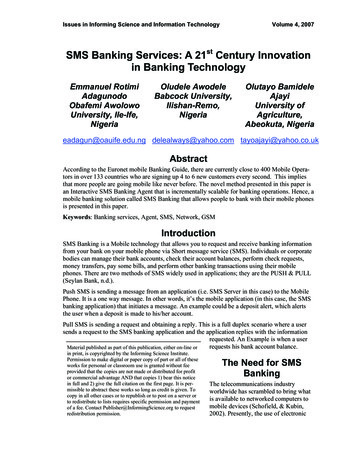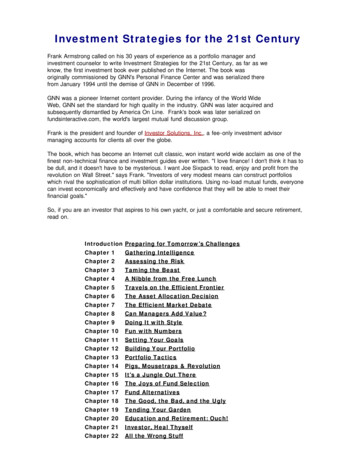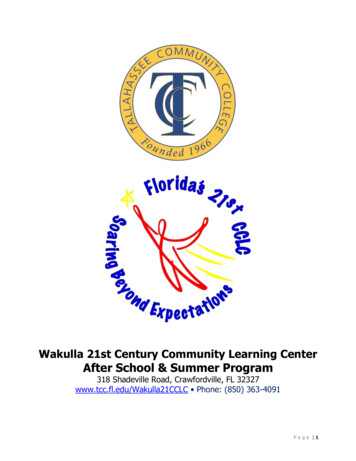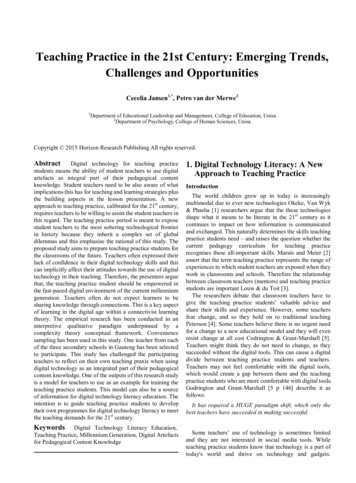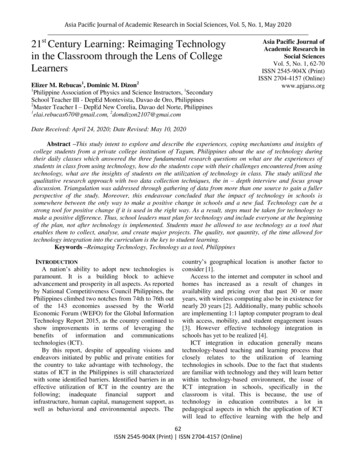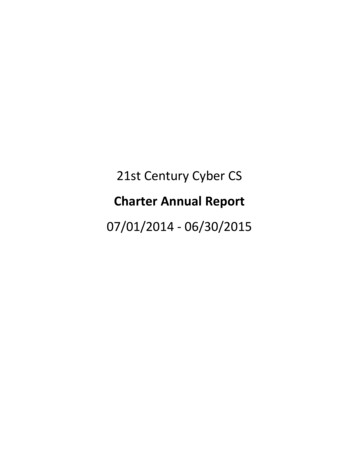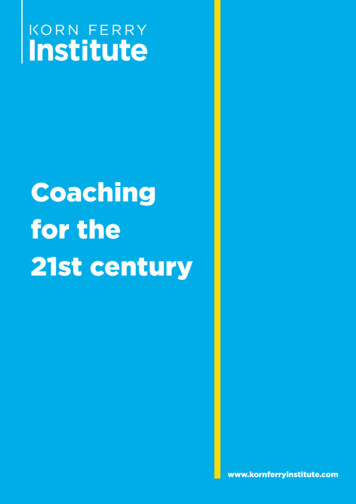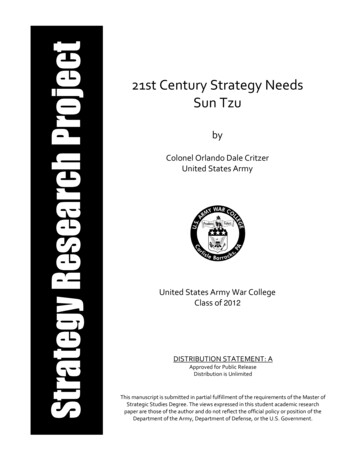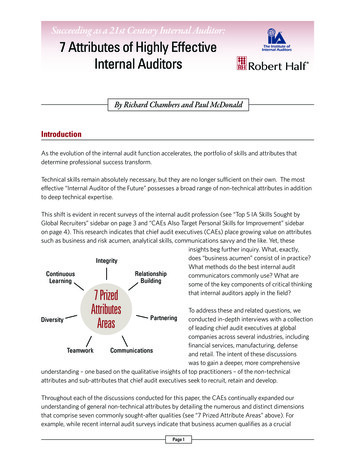
Transcription
Succeeding as a 21st Century Internal Auditor:7 Attributes of Highly EffectiveInternal AuditorsBy Richard Chambers and Paul McDonaldIntroductionAs the evolution of the internal audit function accelerates, the portfolio of skills and attributes thatdetermine professional success transform.Technical skills remain absolutely necessary, but they are no longer sufficient on their own. The mosteffective “Internal Auditor of the Future” possesses a broad range of non-technical attributes in additionto deep technical expertise.This shift is evident in recent surveys of the internal audit profession (see “Top 5 IA Skills Sought byGlobal Recruiters” sidebar on page 3 and “CAEs Also Target Personal Skills for Improvement” sidebaron page 4). This research indicates that chief audit executives (CAEs) place growing value on attributessuch as business and risk acumen, analytical skills, communications savvy and the like. Yet, theseinsights beg further inquiry. What, exactly,does “business acumen” consist of in practice?IntegrityWhat methods do the best internal auditRelationshipContinuouscommunicators commonly use? What areBuildingLearningsome of the key components of critical thinkingthat internal auditors apply in the field?7 PrizedAttributesAreasTo address these and related questions, weconducted in-depth interviews with a collectionDiversityof leading chief audit executives at globalcompanies across several industries, includingfinancial services, manufacturing, defenseCommunicationsTeamworkand retail. The intent of these discussionswas to gain a deeper, more comprehensiveunderstanding – one based on the qualitative insights of top practitioners – of the non-technicalattributes and sub-attributes that chief audit executives seek to recruit, retain and develop.PartneringThroughout each of the discussions conducted for this paper, the CAEs continually expanded ourunderstanding of general non-technical attributes by detailing the numerous and distinct dimensionsthat comprise seven commonly sought-after qualities (see “7 Prized Attribute Areas” above). Forexample, while recent internal audit surveys indicate that business acumen qualifies as a crucialPage 1
Succeeding as a 21st Century Internal Auditor:7 Attributes of Highly Effective Internal Auditorsinternal audit professionals to possess, conversations with leaders in the profession indicate that thisgeneral attribute area consists of numerous equally important dimensions, including: Natural inquisitiveness; Persuasiveness; Change management proficiency; A service orientation; An ability to recognize and respond to diverse thinking styles, learning styles and culturalqualities; and A global mindset.A second theme materialized throughout the interviews. Chief audit executives emphasized that theyview non-technical attributes (once considered “soft skills”) as competitive differentiators in terms ofthe performance of their functions. As Raytheon Chief Audit ExecutiveLarry Harrington so passionately puts it, “Soft skills are the new hardskills, believe me.”“ Soft skills are the newhard skills.”It is the intent of this paper to flesh out this belief with insights,experiences and details culled from actual experiences in the field. Afterbriefly characterizing the current state of internal audit’s evolution, the paper shares these field insightsfor the purpose of helping future internal audit managers and executives understand how they canstrengthen their capabilities in the coming months and years.– Larry Harrington,Chief Audit Executive, Raytheon CompanyInternal Audit’s Current and Future RoleThe “annual” audit plan offers a jarring glimpse into the pace and magnitude of change enacting oninternal audit functions.Not long ago, internal audit would submit the annual plan to the audit committee. Once approved,the document would guide the function’s activities during the subsequent 12 months. “Today thatjust doesn’t happen,” reports Kelly Barrett, Home Depot Vice President-Internal Audit and CorporateCompliance. “Your audit plan can change in the middle of the current quarter now, and sometimes iteven changes on a day-to-day basis.” Although these changes rarely qualify as complete overhauls, theystill require sudden shifts and a high degree of flexibility.The drivers of this volatility are well-known. The pace of global regulatory changes has remained swiftsince the passage of Sarbanes-Oxley and similar legislation and regulations around the world more thana decade ago. The Dodd-Frank Act in the United States, Solvency II in Europe (and possibly in China,Page 2
Succeeding as a 21st Century Internal Auditor:7 Attributes of Highly Effective Internal Auditorswhich is considering a similar framework) the European Union (EU) Data Protection Directive, amongmany other new and emerging rules changes, represent only the latest compliance challenges. Morerules changes are inevitable.Top 5 IA Skills Sought byGlobal RecruitersThe results of the 2012 Global Pulse of theInternal Audit Profession survey conductedby The IIA’s Audit Executive Center deliverdramatic confirmation of how much therequisite skills for internal auditors havechanged.1 Chief audit executives areno longer lined up at the doors of theirlocal universities to bid for newly mintedaccounting graduates. Instead, today’sinternal audit job postings are apt to look forpeople with nontraditional skills to fill vacantpositions. Of the five most sought-afterinternal auditor skills by global recruiters,only one covers a technical area:1. A nalytical and critical thinking (selected by72 percent of respondents)2. Communication skills (57 percent)3. IT general skills (49 percent)4. Risk management (49 percent)5. Business acumen (43 percent)The pace of change also has intensified as the businessworld has grown more global and more interdependent. “Ifwhat is happening in Greece occurred 15 years ago, it wouldnot have the impact on the emotional mindset of the U.S.consumer that it exerts today,” notes former Dow ChemicalCompany Chief Audit Executive Gregory Grocholski, whonow serves as the company’s Business Finance Director forNew Business Development. “If somebody sneezes on theother side of the world today, it can cause the price of oil tojump 5 overnight.”Regulatory changes, economic headwinds and theinterconnectivity of business require most companiesto operate in a more agile manner so they can quicklydodge threats and exploit opportunities. This dynamicforces internal audit – which is responsible for providingassurance on internal controls, risk management andcorporate governance as well as consulting services tothe business – to remain vigilantly informed of the latestglobal developments affecting the company and of how thecompany intends to respond to external drivers of change.Internal audit professionals are expected to operate with the same agility that their companies needto exhibit amid ongoing external volatility. On a professional level, this agility has two dimensions,according to Barrett:1. The intellectual ability required to constantly absorb new information; and2. The flexibility that enables them to switch priorities and projects quickly and comfortably inresponse to rapidly changing business conditions.Part of the balancing act includes managing both assurance and consultative (which many are referringto as “advisory”) work. The CAEs interviewed for this paper emphasize that more of their function’swork qualifies as advisory. This is the case because their functions have managed to adapt to thedizzying pace of business and regulatory change while demonstrating credibility as a business partner.Page 3
Succeeding as a 21st Century Internal Auditor:7 Attributes of Highly Effective Internal Auditors“If you’ve developed a brand as a great audit function, your phone is going to ring off the hook frompeople in the business who want your help,” says Harrington. “At the end of the day, we’re not paid bythe audit report or by the audit finding. We’re paid by how we can make the company better.”Seven Secrets of SuccessIf internal auditors are to help improve the company, their most important capability may boil downto understanding (and responding to) the reality that the world, and its companies, are changingconstantly and quickly as new risks can emerge virtually overnight. Given the pace and magnitude ofchange, agility and flexibility are far from the only attributes leading audit executives seek. Other highlyvalued non-technical capabilities include the following:CAEs Also Target PersonalSkills for ImprovementEach year, Protiviti’s Internal AuditCapabilities and Needs Survey Reportidentifies the personal skills and capabilitiesinternal audit professionals want to improve.2In the 2012 survey report, chief auditexecutives (a subset of the larger respondentgroup) identified only one technical areaamong the top personal skill areas they wantto improve:1. Presenting (public speaking)2. Developing board committee relations(beyond audit committee)Developing outside contacts/networking(tie)3. PersuasionUsing/mastering new technology andapplications (tie)4. NegotiationDealing with confrontation (tie)1. IntegrityEven the most successful internal auditors contend withpush-back. Similarly, even the most thoroughly researched,rigorously supported and fairly presented audit reports cangenerate disagreement.This is only natural: anger and denial represent naturalreactions when human beings receive difficult news, or adisappointing “assessment” on an internal audit report.All of the CAEs interviewed for this paper identifypersonal integrity as a must-have quality at all levels of thefunction. Grocholski asserts that internal auditors have a“professional mandate” to exhibit integrity as well as trust,independence, objectivity and similar qualities in all of theirwork. When hiring, developing and promoting internal auditprofessionals, Grocholski and his managers evaluate thedegree to which internal auditors demonstrate the ability tofulfill this mandate.Resiliency represents another facet of integrity. Regardless of the strength of a company’s businessprocesses and organizational culture, there will be times when managers cringe when internal auditcalls them. “People may push back on you or they may not be completely forthright, especially insituations in which someone has not done a good job,” Barrett says. “You have to be tough and resilientin those scenarios so that you can push through all of the resistance and then work with people in aconstructive manner.”Page 4
Succeeding as a 21st Century Internal Auditor:7 Attributes of Highly Effective Internal AuditorsIntegrity requires confidence, as well as balance. CAEs say their hiring processes are designed todetermine the extent to which integrity is part of a candidate’s personal fabric. For example, HomeDepot’s rigorous selection process requires internal audit candidates to solve a problem in a groupsetting and complete a real-life business case; both exercises help Barrett and her team assess thecandidate’s integrity, among other important attributes.“You cannot perform this role well by simply relying on technical skills and communication skills,”Grocholski asserts. “You’ve really got to integrate this professional mandate – not in an egotistical or overlyauthoritative way, but in a balanced manner – with your technical skills and your communications skills.”2. Relationship-BuildingOne of the most pervasive objectives across all internal audit functions consists of cultivating trust andrespect with other professionals throughout the business.Doing so, CAEs say, helps build productive, highly collaborative and mutually beneficial relationships.Achieving this objective requires the laying of groundwork. As Harrington notes, there is no such thingas “just-in-time networking.”The need to develop healthy, deep relationships with all levels of the business takes time. The mostsuccessful internal audit professionals invest countless hours building trust throughout the organization.Fostering this credibility helps:1. Reduce resistance during the auditing process;2. Increase the speed and volume of information that business partners can deliver in responseto internal audit requests; and3. Encourage the business to understand and embrace internal audit’s consultative role.“If you have a trusting relationship with someone, it’s much easier to have the kind of conversationnecessary to get their rating from an 88 to a 93,” Harrington explains. “Internal auditors often thinkalong the lines of, ‘OK, I have an audit with Scott coming up in two months, so I better go meet Scottand get friendly with him.’ That doesn’t work. Internal auditors, many of whom are introverts by nature,need to go out and invest the time necessary to build genuine relationships well in advance of ‘needing’them.”Effective relationship-building requires several other attributes, including business acumen, knowledgeof the company (and its risks), persuasion and empathy. Internal auditors should be able to walk inthe shoes of the business people they audit. MetLife Senior Vice President and General Auditor KarlErhardt emphasizes that business acumen includes company and risk knowledge in the form of “end-toend process understanding.” For example, an internal auditor should understand the product offerings,the related assets and liabilities, how transactions are processed, the data, the systems and the risksend-to-end.Page 5
Succeeding as a 21st Century Internal Auditor:7 Attributes of Highly Effective Internal Auditors“Persuasiveness also is vital,” Harrington adds. “Internal auditors should possess the ability to convincepeople that they are there to add value to the business.”3. Partnering“Partnership” represents another broad term that CAEs prize, and they seem eager to distill the conceptinto more tangible descriptions and examples.For Erhardt, effective partnering hinges on a service orientation (a key m
Succeeding as a 21st Century Internal Auditor: 7 Attributes of Highly Effective Internal Auditors. Integrity requires confidence, as well as balance. CAEs say their hiring processes are designed to determine the extent to which integrity is part of a candidate’s personal fabric. For example, Home Depot’s rigorous selection process requires internal audit candidates to solve a problem in a .
